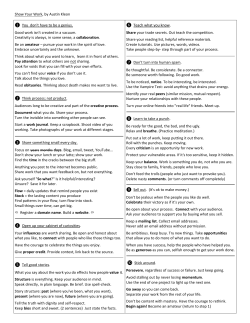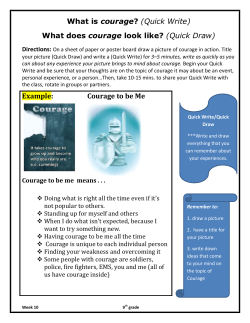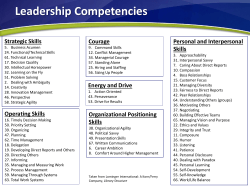
What is Therapy?
What is Therapy? Congratulations! You are about to embark on an exciting journey of self discovery, greater awareness, insight and change. I designed this brochure to introduce you to the therapy process, what therapy is like, and how you can make your experience more beneficial. Let me begin by introducing myself. I received my Masters degree in Social Work in 2007 from Boise State University. I joined Family Health Services in May 2010. I enjoy working with adults, couples and adolescents (ages 16 and older). I am a member of the Idaho Society of Individual Psychotherapists. Prior to a counseling career, I was an illustrator, graphic designer, and art director in advertising. I have learned courage from my clients, loving others from my wife, patience from raising two children, joy from our grandchildren, and laughter from our dog. Making the decision to begin therapy takes courage. Talking with a stranger about deeply personal issues is scary, at first. I hope this brochure will give you a little extra courage today in taking the first step towards healing and hope. Hilber Nelson who is in your family, your work experience, from where you draw strength. The word therapy means “to take care of.” Some questions may feel intimidating, Psychotherapy, then, is about taking care of irrelevant and intrusive. the mind. Therapy My impressions of your involves gaining greater situation are needed to self awareness of your clarify your concerns, thought processes and ensure that (cognitions), treatment is focused on understanding what it’s your issues. Next, you like to be you, how you and I will develop a perceive things, how you simple treatment plan got to where you are now, together. It will state and exploring options to what brought you into therapy, my solve your problems and improve your life. assessment findings, and goals for working People seek therapy for a variety of reasons. together. Setting goals together sets the stage for ensuring effective You feel isolated. therapy. You feel sad, anxious or angry most of the time. Middle stage: In working Benefits of Therapy You’re still grieving the together, it will take time Connect with yourself and with others. loss of a loved one. to build a therapeutic Reduce worry and stress. You’re having trouble relationship, to engage Regain normal activities. adjusting to new fully in the therapy Learn new ways to achieve your goals. circumstances in your life. process, and respond to Work through problems with greater You feel hopeless, helpless. treatment approaches and skill. You have been assaulted or methods. The number of Better understand your own thoughts, abused. sessions varies, often feelings, and responses. Your relationships are not depending on severity of Gain greater self-fulfillment and selfgoing well. symptoms, engagement in mastery. Your attempts to solve the process, the client’s Reduce risk of relapsing. your problems are not resources and working. environment. You need support with Ending stage: Ideally, you making an important change in your life. will end therapy when you are satisfied Benefits of therapy with the work you’ve done and have Stages of Therapy reached your goals. Sometimes, clients Beginning stage: At the first session, I know they are ready. There is less to say, conduct an assessment of what brings you to they are effectively coping, feeling less therapy. I may ask you to tell your story, distressed, are seeing significant describe your symptoms, what you have improvement in their lives. Usually, tried to solve your problems, how you cope, appointments are tapered off gradually. You can’t direct the wind but you can adjust your sails. Making Therapy Effective Your success depends a lot on your willingness to engage in the process, an openness to explore new approaches and evaluate new ideas. The quality of the relationship between therapist and client is a big contributor. Research demonstrates that clients who invest in the healing process, regularly attend sessions and carry out homework assignments get better faster and stay better longer. If you find yourself skipping sessions or are reluctant to go, ask yourself why. Are you avoiding painful discussion? Did the last session touch a nerve? Let’s talk about your reluctance. Therapy is not always pleasant. Painful memories, frustrations or feelings might surface. This is a normal part of therapy and I will guide you through this process safely. Therapy should be a safe place. While there will be times when you’ll feel challenged or when you’re facing unpleasant feelings, you should always feel safe. If you’re starting to feel overwhelmed or you’re dreading your therapy sessions, talk to me. Ask yourself: Is my life changing for the better? Am I meeting the goals I set with my therapist? Do I feel like I’m starting to understand myself better? Do I feel more confident, more connected to others, myself, and my beliefs? Are my relationships improving? How People Change Therapy helps to jump start the change process. Therapists don’t change people; rather, people change with the help of therapy. Change is a process that occurs over time. The amount of time for change is different for everyone. People tend to make changes in their lives when they are motivated and fully engage in the therapy process. Change begins with having a vision for what you would like to see different in your life (vision), and a belief that you have the ability and resources to get there (“I can do this!”). Therapists walk with others in that journey. My experience has been that we make changes when: Our problem becomes intolerable. We take responsibility for our problem. We believe that the actions needed to make the change will be effective. We believe our efforts to change will be supported by others. We can envision a better future. Knowing if Therapy is Working There is no smooth, fast road to recovery. It’s a process that’s full of twists, turns, and occasional setbacks. That’s okay. It’s all part of the process. Be patient and don’t get discouraged. It’s not easy to break old, entrenched patterns. Remember that growth is difficult, and you won’t be a new person overnight. But you should notice positive changes in your life. Your overall mood might be improving. Or a crisis that might have overwhelmed you in the past doesn’t throw you as much this time. Courage doesn’t always roar. Sometimes, courage is the quiet voice at the end of the day, saying, “I will try again tomorrow.” Getting the Most Out of Psychotherapy Therapy Approaches There are many directions for reaching your destination. Certain treatment methods are best suited for certain problems. I take a diverse and holistic approach that encompasses a person’s mind, body, and spirit. With a healthy respect for my client’s worldview, I am comfortable with integrating the whole person within a strengths-based approach. I tailor a variety of therapy methods for treating depression, anxiety, trauma, guilt, shame, relational problems, grief and loss, and phase of life problems. Cognitive-behavioral therapy reduces the intensity and frequency of symptoms by modifying dysfunctional thoughts, assumptions, beliefs, and behaviors. EMDR therapy (Eye Movement Desensitization and Reprocessing) is used to address disturbing life experiences. EMDR stimulates information that allows the brain to process the experiences. (www.emdr.com) Gottman Couples Therapy is a structured, goal-oriented, scientifically-based therapy designed to increase respect, affection, closeness, and resolve conflict through greater understanding. (www.gottman.com) Mindfulness therapy is learning simple mind-body techniques to become more -Mary Anne Radmacher aware of your thoughts, inner resources, and better respond to life’s challenges. Insurance and Payment Options We accept all major health insurance plans, including Blue Cross-Blue Shield, IPN, Medicare & Medicaid (ID & NV) and TriCare. A sliding fee discount is offered with qualifying proof of income. No one is refused care based on inability to pay. Our experienced staff is ready to assist you with any questions concerning insurance and payment. Making an Appointment A referral from your medical provider is preferred. We also take self-referrals. Please allow 24 hours for processing. We ask that you call to schedule your appointment yourself, or as a parent/guardian. Family Health Services Behavioral Health 1102 Eastland Drive North Twin Falls, ID 83301 Phone: 208-734-1281 Fax: 734-1282 www.fhsid.org Hilber Nelson Licensed Clinical Social Worker
© Copyright 2025





















